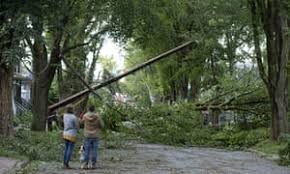Dispatch from Canada
On September 7, 2019, Hurricane Dorian completed its devastating track with a direct landfall on Nova Scotia. Michael Freill reports on the repercussions:
Dorian essentially devastated the Bahamas before skirting the United States on its way for a direct landfall just east of Halifax, Nova Scotia. Fortunately, the Category 2 storm was downgraded to a post-tropical storm when it made landfall. Still, the vulnerability of the electrical grid became very evident, as 80% of the entire province of Nova Scotia, roughly 450,000 customers, lost power. In about half of these cases power was restored within three days, but for the other half, power restoration took longer, and for many it took weeks.

What has become known to many who have oil-heated homes is that a small generator coupled with a heating oil boiler offers the best combination for the future when dealing with weather-related events that cause damage to the electrical grid. Heating oil has the highest density among stored fuels, and has the distinction of having the highest ratio of stored energy/storage area compared to all other available fuels. It can be efficiently delivered (less deliveries per BTU content) compared to propane or LNG and it can be stored safely in a home. When this energy source is combined with a generator or solar power system the outcome is a reliable and comfortable heated home off grid.
When calculating home space heating and domestic hot water energy requirements for a conventional home, a boiler system will need approximately 230 watts of electrical power to operate when the boiler and circulator is running, and approximately 1000 watts on start-up. A small suitcase generator will run the entire system without any problem. If we look at incorporating ECM circulators and efficient burner motors, the wattage requirements drop below 200 watts. Based on the average home consumption of 820 gallons a year the daily electrical requirements will be approximately 650 watts per day to run the entire heating system in the winter.
I attended the International SPI/ESI’s Smart Energy Week trade show (Sept. 23-26) in Salt Lake City, Utah, where 20,000 solar professionals gathered for educational seminars, training and vendor displays. The advancement in solar power generation is evident as today a single standard solar panel can achieve up to 400 watts of power per hour. This is double what panels could produce 10 years ago. What is also evident is solar panel generation is not going to take over the world and displace conventional power any time soon, as it has become obvious to the industry that the electrical transmission grid cannot handle the variability in power generation. In places like Hawaii, where the solar push was strong due to the high cost of power and reduced prices for panels, the electrical utilities were caught off guard by power spikes generated by the 10% of solar generation. They now have to curtail power generation from solar. The problem is the electrical grid cannot handle the voltage spikes. When the sun is out, everything is fine until a cloud comes by and the voltage immediately drops. There is no known way to prevent this spiking unless the solar is coupled to a storage unit i.e. battery! This leads me back to my analysis above.
In the future if everyone is going to be required to add battery storage to their solar system or community micro grid (as some utilities are now requiring), it may just make sense to run your entire oil heated boiler on your battery storage system. A standard home battery storage unit with 4.6 KWH of battery storage would power the home heat system for seven days without any sun. With today’s technology and panel advancement, you would typically need three standard solar panels coupled with a battery to produce adequate power for the system to operate year-round. When reality finally catches up to the politicians on what can be achieved with electrification of everything, solar panels alone will not solve all their problems. Attempts to heat a home with a heat pump combined with an electric hot water tank for domestic use would simply require too much solar power to be practical or affordable. Where the electrical transmission grid has now become the limiting factor to the electrical industry, the heating oil storage system combined with solar could become the future of self-sufficient smart homes.
Michael Freill, a professional engineer, is the owner of Mark 1 Engineering Ltd., a company in Dartmouth, Nova Scotia, that specializes in leak detection and containment for the oil heat and hydronic industries.
